The world was taken on a rollercoaster ride in 2002, as the US upped the ante in the war on terror and economic markets see-sawed -- leaving everyone to wonder, `Where do we go from here?'
1.Bush's war on terror escalates
It may have started in Afghanistan, but 2002 saw US President George W. Bush's war on terror leapfrog national borders and encircle the world with its frantic search for evildoers -- no matter where they might lurk.
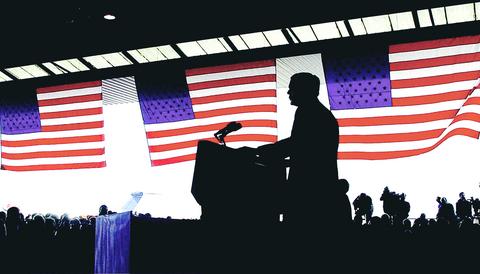
PHOTO: AP
With terrorist No. 1 Osama bin Laden evading the allied war machine hunting for him in the hills of Tora Bora, Bush leveled his sights elsewhere, warning Americans in January's State of the Union address that terrorists "are now spread throughout the world like ticking time bombs -- set to go off without warning."
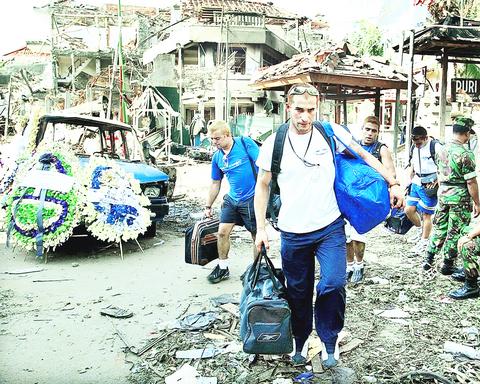
PHOTO: AP
By June, the White House had unearthed its new targets, attacking in Bush's year-defining "Axis of Evil" speech the state-sponsored terrorism of Iran, Iraq and North Korea. But while the president's bombast soothed American dismay over a seemingly unwinnable war, elsewhere it added fuel to mounting fears over US unilateralism.
Terrorists, meanwhile, would-be and otherwise, were still making their presence felt. Shoe bomber Richard Reid -- in court for attempting to blow up an American Airlines flight from Paris to Miami last Christmas -- candidly told a Boston judge in October, "Basically I got on the plane with a bomb. Basically I tried to ignite it."
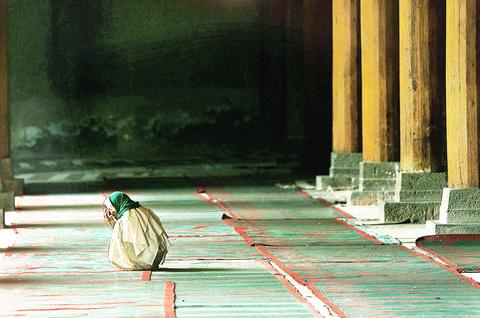
PHOTO: AP
On Oct. 12, 191 mostly young Australians lost their lives in an explosion in a Bali nightclub, while on a bright, late November morning in Kenya, three suicide bombers smashed a truck laden with explosives through the gates of an Israeli holiday compound, igniting a fireball that killed 12 people.
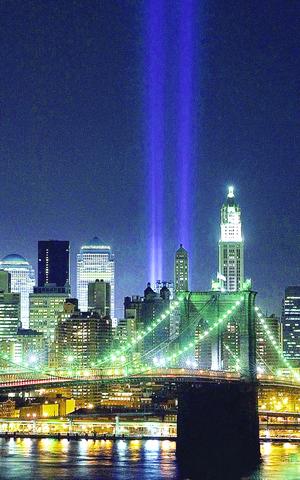
PHOTO: AP
North Korea made sure it was also in Bush's thoughts at Christmas time by revealing that it not only had an ongoing nuclear weapons program but it was nearing completion. That forced US Defense Secretary Donald Rumsfeld to pointedly remark on Dec. 23 that, as US and British troops gear up for a likely Iraq offensive next year, the US is "capable of fighting two major regional conflicts" -- and easily winning both.
-- Andy Morton
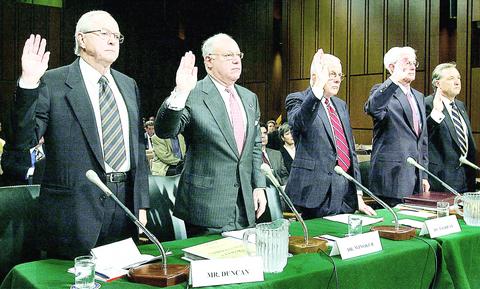
PHOTO: AP
2. Bali in frontline on war of terror
Paradise became hell when a bomb attack on the island retreat of Indonesia's Bali killed 191, among them five Taiwan-based people.
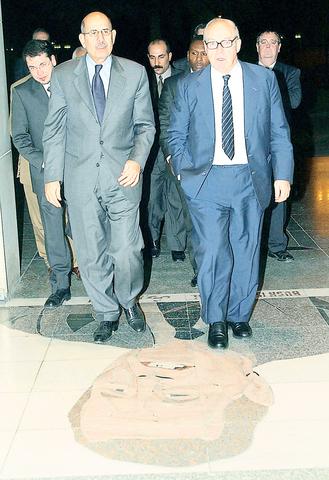
PHOTO: AP
The popular resort town of Kuta was packed with revellers just after 11pm on Oct. 12, when two small bombs left in plastic bags went off outside two pubs on the main drag.
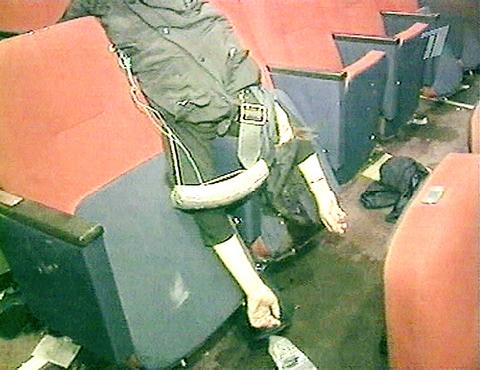
PHOTO: AP
Hundreds of tourists and locals poured out onto the streets and soon after, another much bigger bomb went off.
A minivan parked outside the Sari Club had been packed with explosives and went off sending shrapnel in every direction.
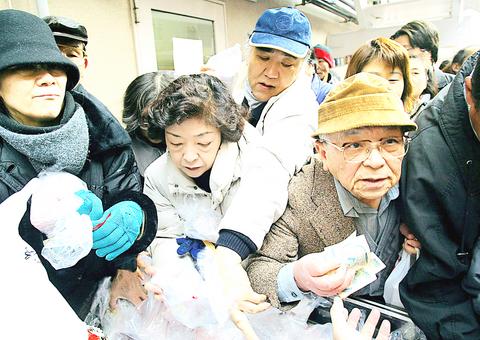
PHOTO: REUTERS
In addition to those killed, around 350 were injured in the outrage, mostly Australian tourists and locals, who were drinking in the clubs on the strip, working there, or just in the wrong place at the wrong time.
Around 15 Taipei Baboons Rugby Football Club members and five supporters had traveled to Bali from Taiwan for the annual 10s rugby tournament. Four foreign players died along with a Taiwanese supporter of the team.
That the Bali bomb went off on the second anniversary of the USS Cole attack proved to be no coincidence.
It was immediately suspected that there were links between the deadly bomb blasts and al-Qaeda and these fears were later confirmed as Indonesian police swooped on suspects linked to the explosions.
Amrozi, a 39-year-old mechanic from East Java was found to have bought the explosives and owned the van used in the blast.
His alleged field commander Imam Samudrain then admitted an association with al-Qaeda's pointman in Southeast Asia, Riduan Isamuddin, also known as Hambali.
The Bali bombings brought home the fact that Asia was firmly involved in the "war on terror" and showed that no country was safe, including Taiwan.
-- Jules Quartly
3. The Euro is here at last
Available only as a virtual currency since 1999, the euro finally became cash in Europeans' pockets on Jan. 1 last year, realizing a plan hatched more than 30 years before as a way to end exchange-rate instability.
While some regard the single European currency as an affront to national sovereignty, and others a great leap toward European harmony, the main concern for most citizens in the eurozone, as the 12 countries joining in the first wave became known, was the practical repercussions of switching currencies.
But the much-feared confusion failed to materialize. Retailers, the first to have to deal with the changeover, had been preparing for months and encountered only minor delays on the first day of the euro's use, as customers sorted out the new notes and coins and staff double-checked change, always given in euros.
The euro was initially used alongside national currencies, with each country deciding when to ditch its own currency. On Jan. 28, the 776-year-old guilder ceased to be legal tender in the Netherlands, with few expressing any sense of loss. Less than two weeks later, the Irish punt was no more, and by Feb. 28, the euro was the only currency accepted for purchases anywhere in the eurozone.
With the switch to the euro passing off with such little brouhaha, attention has now turned to the three EU members who have not joined.
Danes voted against joining the euro in 2000 and are unlikely to vote again on the issue anytime soon. In November last year, Sweden decided to hold a referendum this year on joining the single currency, piling pressure on the other hold-out, Britain, to do the same.
Despite regaining much of the 30 percent loss in value it sustained in the three years before its launch, the euro is now less popular with those that use it, largely because of real and perceived price rises.
-- Graham Norris
4. Smoke and mirrors at Beidaihe
In the months leading up to the CCP's 16th National Congress, Chinese President Jiang Zemin (江澤民) threw a curve ball.
A year before the congress was to convene, it was assumed that Hu Jintao (胡錦濤), Jiang's heir, would take the reins. Yet Xinhua was airing accolades about Jiang and his "three represents" theory, but references to Hu were almost nonexistent.
International observers were left wondering if Jiang was in the process of engineering a silent coup by retaining the three top posts, the presidency, chairman of the party and head of the military.
In early November, the congress got underway as Jiang maneuvered his people into the Politburo Standing Committee by expanding its existing seven slots to nine and getting rid of a reformer who had held his post since the 1980s. And Jiang will probably retain his post as head of China's military after the National Party Congress (NPC) convenes next spring.
Hu ended up with the presidency and the title of secretary general of the party. But the real question come March is how much power will Hu really have. Even Hu has reportedly said he will confer with Jiang on important issues.
With the Politburo stacked in Jiang's favor, and if his grip on the is PLA secured, Hu will have to cultivate more political allies before he has any real say in how the country is run.
As it stands now, Hu has few allies in the upper echelons of the Chinese government. Hu will also have to keep his eye on Zeng Qinghong (曾慶紅), a member of the Central Standing Committee and close ally of Jiang's who is doing everything he can to reduce Hu's influence.
Hu, it appears, will be the weakest of China's leaders since 1949, and he may have to wait until Jiang's older Shanghai faction slips before he can implement his own ideas.
-- Hyatt Lee
5. Trouble in the counting house
Accountants had something to talk about at their Christmas parties this year.
After a year of corporate scandals, public attention was focussed on the normally staid profession as never before.
From Enron to WorldCom to Adelphia, American corporate titans went down amid charges of securities fraud and other financial sleights of hand, forcing a closer look at the relationship between auditors and the companies they scrutinize.
In March, auditing giant Arthur Andersen was indicted for shredding Enron documents, and in July, telecom provider WorldCom became the biggest US company in history to file for bankruptcy protection. The announcement came after WorldCom admitted it inflated earnings by US$3.85 billion over five quarters.
Even homemaking icon Martha Stewart was embroiled in scandal as US federal investigators probed allegations she sold shares of ImClone Systems on the basis of inside information.
The series of scandals shook an economy desperately looking for signs of a rebound, but amid the bad news came hopes for improved corporate governance.
The US Securities and Exchange Commission (SEC) took steps to force chief executives to certify their financial statements and Congress moved to create a new oversight board for the accounting industry with the Sarbanes-Oxley Act.
Facing charges his administration was too lenient when it came to corporate fraud, US President George W. Bush appointed Wall Street investment banker William Donaldson to replace Harvey Pitt as head of the SEC.
The scandals exposed serious weaknesses in how executives are compensated, with the proliferation of stock options having fuelled a short-term bias among corporate leaders to the detriment of shareholders.
-- Stephen Graham
6. Upping the ante on Iraq
On Sept. 12, US President George W. Bush upped the ante on the "Axis of Evil."
He informed the UN General Assembly that his administration would work with the UN Security Council, but if it failed in its role, the US reserved the right to prosecute a second US-Iraq war on its own.
Within a month, France and Russia -- two permanent members of the Security Council with veto power -- had both taken umbrage at Bush's go-it-alone cowboy swagger, and demanded that the wording of a security resolution avoid handing the US carte blanche to wage war on Iraq. The crux of the issue, of course, was how the UN was going to monitor Iraqi President Saddam Hussein's alleged development of weapons of mass destruction.
On Nov. 8, Bush and his team got what they wanted, UN approval of an inspections regime stipulating that Saddam must give the UN team unfettered access to any suspected weapons sites and Iraq must submit a document detailing any programs designed to produce chemical, biological or nuclear weapons.
The inspectors returned on Nov. 18 and on Dec. 7 Iraq sent a 12,000-page report on its weapons development program.
Whether the Bush administration will accept the findings of the UN weapons inspectors is anybody's guess. Yet, US Vice President Dick Cheney may have dropped a hint to veterans in Nashville, Tennessee, in mid-August by saying, "A return of inspectors would provide no assurance whatsoever of his compliance with UN resolutions."
On Dec.19, US ambassador to the UN John Negroponte declared that Iraq was in "material breach" of the UN Security Council resolution, though the council itself has made no such ruling.
The US is sending thousands of troops to the Persian Gulf. We'll soon find out if Bush is as patient as he says he is.
-- Hyatt Lee
7. Ronaldo lifts World Cup
Asia's first World Cup was a fairytale.
It was the first tournament to have been co-hosted -- by South Korea and Japan -- and the first World Cup of the new millennium.
On the field, the undisputed kings of soccer and samba were seeking a record fifth World Cup trophy -- but no-one knew if Brazil's brightest star, Ronaldo, would be the player he had been after taking two years to rebuild his knee.
There would also be challenges from European powerhouse Germany (three World Cups), an emerging US and dark horses Senegal and Turkey.
As for the host countries, it was important for reasons of face, national pride and to justify holding the World Cup in Asia, that they did well.
And they did, South Korea in particular, cheered on by the impassioned massed ranks of "Red Devils" supporters, who became an abiding image.
While Japan managed to qualify from the group phase of the competition for the first time, it was South Korea that turned giant-killer, sending home Portugal, Italy and then Spain to reach the semifinals. Though it lost to Turkey in the runners-up match, fourth place at the World Cup on home soil was fantasy football.
The final, however, was a fairytale, with the two best teams in World Cup soccer meeting at the end of four weeks play, following the elimination of 30 other countries from the tournament.
The match was cast as Ronaldo vs. Oliver Kahn, a heavyweight contest between Brazil and Germany, the Americas against Europe, striker against 'keeper.
"The Phenomenon" exorcised the ghosts of 1998 -- when he sleepwalked through the final against France -- and scored twice at Yokohama Stadium in Japan, paving the way to a 2-0 victory.
His performance crowned one of the best World Cups ever.
-- Jules Quartly
8. Chechnya: Bring it all back home
Well into their second war in 10 years with the Russians, and with Grozny looking like Dresden after the allied bombing in World War II, Chechen militants decided to take their war to Moscow.
On Wednesday Oct. 23, Chechen rebels took 700 hostages at a theater in Moscow and demanded that the Russians pull all of their troops out of Chechnya. Referring to themselves as smertniki, or those willing to die, the rebels told Russian authorities that they would begin executing hostages at 6am on Oct. 26, until their demands were met. And they played a desperate gambit by stating that if the theater was breached, they would blow it up.
The militants were calling Russian President Vladimir Putin's bluff. After all, Putin had announced in April that the war in Chechnya was officially over and that Russia was pulling out. The Kremlin's media blackout on all things Chechen followed soon after.
Putin sent in the same Spetsnaz anti-terrorism unit to surround the theater that he sent to Budennovsk after Chechen rebels seized a hospital in 1995.
The first two days of the theater siege were tense but productive. Putin announced that the government would talk with the rebels and, in turn, the militants released several hostages.
But on Oct. 26, things quickly went awry as Russian forces stormed the theater. In an attempt to subdue the Chechens, the anti-terrorist unit used an opiate-based gas that ended up killing 118 hostages and virtually all of the rebels. The rebels who were alive but sedated were killed point blank in their sleep by Spetsnaz agents.
The tragic outcome of the siege highlighted concerns both in Russia and internationally that the Kremlin's protracted conflict with the Chechens had all but lost its raison d'etre.
-- Hyatt Lee
9. East Timor: Freedom at last
On May 19 last year, East Timor finally gained independence from Indonesia and joined the UN on Sept. 27.
An emotional midnight independence ceremony in the capital city of Dili marked the end of four centuries of Portuguese colonial rule, 24 years of brutal Indonesian occupation and two-and-a-half years of interim rule by the UN.
Hundreds of thousands of East Timorese were killed following a US-sanctioned invasion by Indonesia in 1976 and during the subsequent occupation -- through forced migration, starvation and murder.
Following the economic crash and political convulsions that destroyed Indonesian dictator Suharto's government in 1998, the East Timorese were offered a UN-administered referendum the following year, in which they voted overwhelmingly for independence, only to be engulfed once again by Indonesian terror as troops and militias ravaged the territory.
Two thousand people were killed in that period of violence alone and suddenly the world took notice.
UN forces were given power to clamp down and restore a semblance of peace and on May 19 the people's wish for freedom from Jakarta could finally be realized. Shortly after the ceremony, 55-year-old poet and former guerilla leader Xanana Gusmao was formally sworn in as the new country's first president.
Last Friday, Indonesia's special tribunal on the 1999 violence finally sentenced a military officer to five years in jail for crimes against humanity. The sentence comes one week after Human Rights Watch issued a scathing report on the tribunal and called it a "whitewash."
East Timor's problems remain grave. President Gusmao has to rule one of the poorest countries in the world with a 70-percent unemployment rate and an illiteracy rate of 43 percent.
-- Charles Engelbrecht
10. World economy slows down
The world awoke on Jan. 1, last year to an economic hangover; the heady days of dot-com-fuelled growth had become but a distant memory.
The US and the EU were expected to recover from the previous year's slowdown, yet growth remained shaky throughout the year. In an effort to get the economy going again, the US Federal Reserve cut the benchmark short-term interest rate to its lowest level in 40 years in November.
But the outlook remains uncertain and fears are growing about deflation, a demon once thought confined to the economic history books.
In the EU, a two-year slowdown continued as the economic block banked on a global rebound that never materialized. The EU's largest national economy, Germany, struggled to get a handle on unemployment, now at around 10 percent. In a report released Dec. 12, the European Central Bank forecast economic growth in the euro-zone for last year of just 0.6 percent to 1 percent.
Expectations for Japan were low after a decade of economic malaise. With the Nikkei 225 Stock Average finishing the year down 17 percent, those expectations proved to be well-founded as Asia's traditional growth engine continued to sputter.
China was the year's bright spot. As the year drew to a close, the nation's Bureau of Statistics reported GDP grew by an estimated 8 percent for last year.
Yet China's rise appears to have done little for its neighbors as investment that once flowed to other Asian nations dried up in favor of China's lower costs.
Complicating hopes for a economic recovery is the prospect of war in Iraq.
And so the year ended the same way it began, with the economy unsure of itself and analysts expecting an upturn just around the corner -- a long hangover indeed.
-- Stephen Graham

A magnitude 6.4 earthquake struck off the coast of Hualien County in eastern Taiwan at 7pm yesterday, the Central Weather Administration (CWA) said. The epicenter of the temblor was at sea, about 69.9km south of Hualien County Hall, at a depth of 30.9km, it said. There were no immediate reports of damage resulting from the quake. The earthquake’s intensity, which gauges the actual effect of a temblor, was highest in Taitung County’s Changbin Township (長濱), where it measured 5 on Taiwan’s seven-tier intensity scale. The quake also measured an intensity of 4 in Hualien, Nantou, Chiayi, Yunlin, Changhua and Miaoli counties, as well as

Taiwan is to have nine extended holidays next year, led by a nine-day Lunar New Year break, the Cabinet announced yesterday. The nine-day Lunar New Year holiday next year matches the length of this year’s holiday, which featured six extended holidays. The increase in extended holidays is due to the Act on the Implementation of Commemorative and Festival Holidays (紀念日及節日實施條例), which was passed early last month with support from the opposition Chinese Nationalist Party (KMT) and Taiwan People’s Party. Under the new act, the day before Lunar New Year’s Eve is also a national holiday, and Labor Day would no longer be limited

COMMITMENTS: The company had a relatively low renewable ratio at 56 percent and did not have any goal to achieve 100 percent renewable energy, the report said Pegatron Corp ranked the lowest among five major final assembly suppliers in progressing toward Apple Inc’s commitment to be 100 percent carbon neutral by 2030, a Greenpeace East Asia report said yesterday. While Apple has set the goal of using 100 percent renewable energy across its entire business, supply chain and product lifecycle by 2030, carbon emissions from electronics manufacturing are rising globally due to increased energy consumption, it said. Given that carbon emissions from its supply chain accounted for more than half of its total emissions last year, Greenpeace East Asia evaluated the green transition performance of Apple’s five largest final

Taiwan is to extend its visa-waiver program for Philippine passport holders for another year, starting on Aug. 1, Minister of Foreign Affairs Lin Chia-lung (林佳龍) said on Friday. Lin made the announcement during a reception in Taipei marking the 127th anniversary of Philippine independence and the 50th anniversary of the establishment of the Manila Economic and Cultural Office (MECO) in Taiwan, the Ministry of Foreign Affairs said. The decision reflected Taiwan’s commitment to deepening exchanges with the Philippines, the statement cited Lin as saying, adding that it was a key partner under the New Southbound Policy launched in 2016. Lin also expressed hope